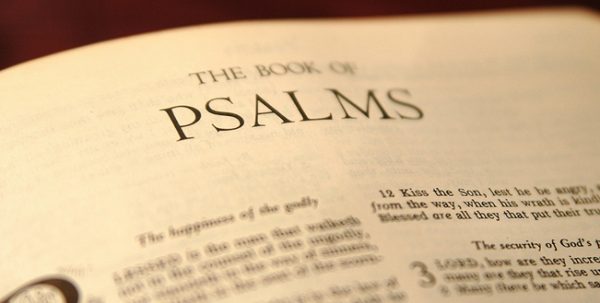“As a deer longs for flowing waters, so my soul longs for You, o God.
My soul thirsts for God, for the living God. When shall I come
and behold the face of God?” Psalm 42:1-2
It is not a stretch to say that in our busy lives, and pulled as we are by the attractions of a culture that resembles a moral jungle, even committed Christians often agonize over the quality of their spiritual lives. Their struggle, as they try to match spiritual ideals with everyday hard facts, sometimes becomes a kind of “hell.” On the one hand, they deeply feel in their soul a thirst for the living God and rejoice when they find Him; but on the other hand, they become so preoccupied with worldly affairs and suffer guilt over their own shortcomings that they despair when they perceive the absence of God in their lives. The Psalmist long ago faced a similar dilemma longing for God yet lamenting: “When shall I come and behold the face of God?”
The absence of God can be very real to us but it is not so to God. God is never absent from our lives. The God we know in Jesus Christ, “the Father of mercies and of all comfort” (2 Corinthians 13), is closer to our souls than we are to our own very selves. God is all around us and within us because He has created all things and sustains all things. If God were to withdraw His presence and power from us, the world would shrink and vanish. As a wise and loving parent, God is always both ready and eager to converse with His children, to encourage and guide them, to inspire and nourish them. Nothing pleases God’s heart more than to see His children growing in their spiritual life, united, helping each other, joyful and celebrating life in gratitude as a gift from God.
To us, however, the absence of God can be real and painful when we recognize that we lack true faith and feel distant and alienated from God. Distance and separation from God mark the classic definition of “hell” as the absence of God. That frightful spiritual gap can only be bridged by a genuine life of faith. True faith is not merely mental assent to Christian beliefs, for example the mere belief that there is a higher power we call God. It is much, much more: true faith is ongoing personal trust in God, an inner prayerful connection with Him, an awareness of His love in our hearts, energizing and driving us forward in the life of faith. Jesus spoke to the Samaritan woman about “living water” and said to her: “The water that I shall give him (whoever believes and follows Christ) will become in him a spring of water welling up to eternal life” (John 4:14). The woman said to Jesus: “Lord, give us this water” (John 4:15)! We need to pray these words again and again.
The Book of Psalms provides an immensely rich source for those who long for personal communion with living God. The Book of Psalms is like a great mirror in which is reflected the whole range of the human religious experience—faith and doubt, repentance and callousness, humility and pride, joy and sorrow, confidence and despair, celebration and lament, love and anger, mercy and condemnation, salvation and judgment, praise of God and complaint against God! As the primary prayer book of the Church, the Book of Psalms leaves no sentiment of the heart untouched. At the same time it supplies the language, emotions, truths and insights by which the soul can express its concerns, its troubles, its joys, its frustrations, and so seek to find its way to a loving and empowering God.
In prayer people are often tongue-tied because they cannot find the right words to pray. The Book of Psalms can help in virtually endless ways:
Give ear to my words, O Lord; give heed to my sighing;
Listen to the sound of my cry, my King and my God, for to You I pray. (Psalm 5:1-3).
To You, O Lord, I lift up my soul. O my God, in you I trust . . .
Make me to know Your ways, O Lord; teach me You paths (Psalm 25:1-2,4).
In times when inner assurance and strength are needed, we meet with inspirational words such as these:
I lift up my eyes to the hills—from where will my help come?
My help comes from the Lord, who made heaven and earth. (Psalm 121:1-2).
The Lord is my light and my salvation; whom shall I fear?
The Lord is the stronghold of my life; of whom shall I be afraid? (Psalm 27:1).
In times of pain, sickness, or fear, we can pray:
O Lord, heal me, for my bones are shaking with terror.
My soul also is struck with terror, while You, O Lord—how long?
Turn, O Lord, save my life; deliver me for the sake of your steadfast love. (Psalm 6:2-4).
In times of heartfelt repentance and longing for renewal, we can beseech God:
Create in me a clean heart, O God, and put a new and right spirit within me.
Do not cast me away from Your presence and do not take Your Holy Spirit from me.
Restore to me the joy of Your salvation. . . (Psalm 51:10-12).
In times of frustration and anger, God permits us to express our sincere deep feelings, even feelings of strong complaints and near despair, for in such prayers too we affirm our ultimate trust in God and do not sink in absolute despair:
How long, O Lord? Will You forget me forever?
How long will you hide Your face from me?
How long must I bear pain in my soul . . .
Consider and answer me, O Lord my God (Psalm 13:1-3)!
In times of joy and celebration, the words of the Psalms are unequalled:
Praise the Lord! Praise the Lord, O my soul! I will praise the Lord as long as I live;
I will sing praises to my God all my life long! Psalm 146:1-2).
Praise Him, all His angels; praise Him, all His host! Praise Him, sun and moon;
praise Him, all you shining stars (Psalm 148:2-3)!
What is then required to grow in the life of God? How can we, if willing and resolved, come and drink from the life-giving waters that flow from the grace of the Holy Spirit? The gifts of God are free. His blessings are for all. What is required first of all is to turn on the switch: firm resolve to lead the life of faith as heartfelt trust and obedience to God. Because we are made for God and for personal communion with Him, all people have a deep-seated hunger for God but many seek vainly to satisfy this need with the things of this world. We also need practical disciplines such as regular worship, prayer, edifying activities, reading the scriptures, keeping company with Christian friends, and acts of kindness towards all. In this regard, the Book of Psalms is invaluable by reasons of its accessibility, its richness, its expressions of honest and strong emotions, its inspiring language and metaphors, its deep and unwavering trust in God even in the bleakest moments. “Even though I walk through the valley of the shadow of death, I fear no evil; for You are with me; You rod and Your staff—they comfort me” (Psalm 23:4).
Here are some practical tips about how to use the Book of Psalms. Find a translation of the Bible with which you feel comfortable. Put aside some time for reflection, even five to fifteen minutes each day at a regular schedule. Consider it your “holy hour” in which you keep special company with God. Read a few psalms at each sitting. Highlight on the margins the verses that you find most helpful. Leave aside the verses that not helpful. The many, admittedly disturbing, references to curses over enemies and the destruction of sinners can be bracketed. These can no longer be part of the prayers of Christians because Christ has taught us to love our enemies and to pray for those who persecute us. A right-minded Christian can neither curse nor ever wish evil on anyone. Rather, she or he hurts for all and prays for the salvation of all. As you read the Psalms, copy in a journal your favorite verses and memorize them recalling them during the day. Once you finish the whole Book of Psalms—and it is a labor of faith and love!–, begin again, but now read and meditate on the verses that you have already highlighted. You will be amazed at the changes that will occur within you by God’s grace. You will be like the deer that has found the source of fresh waters, the living God in his holy presence and power, strengthening and guiding you in your journey of life.

















